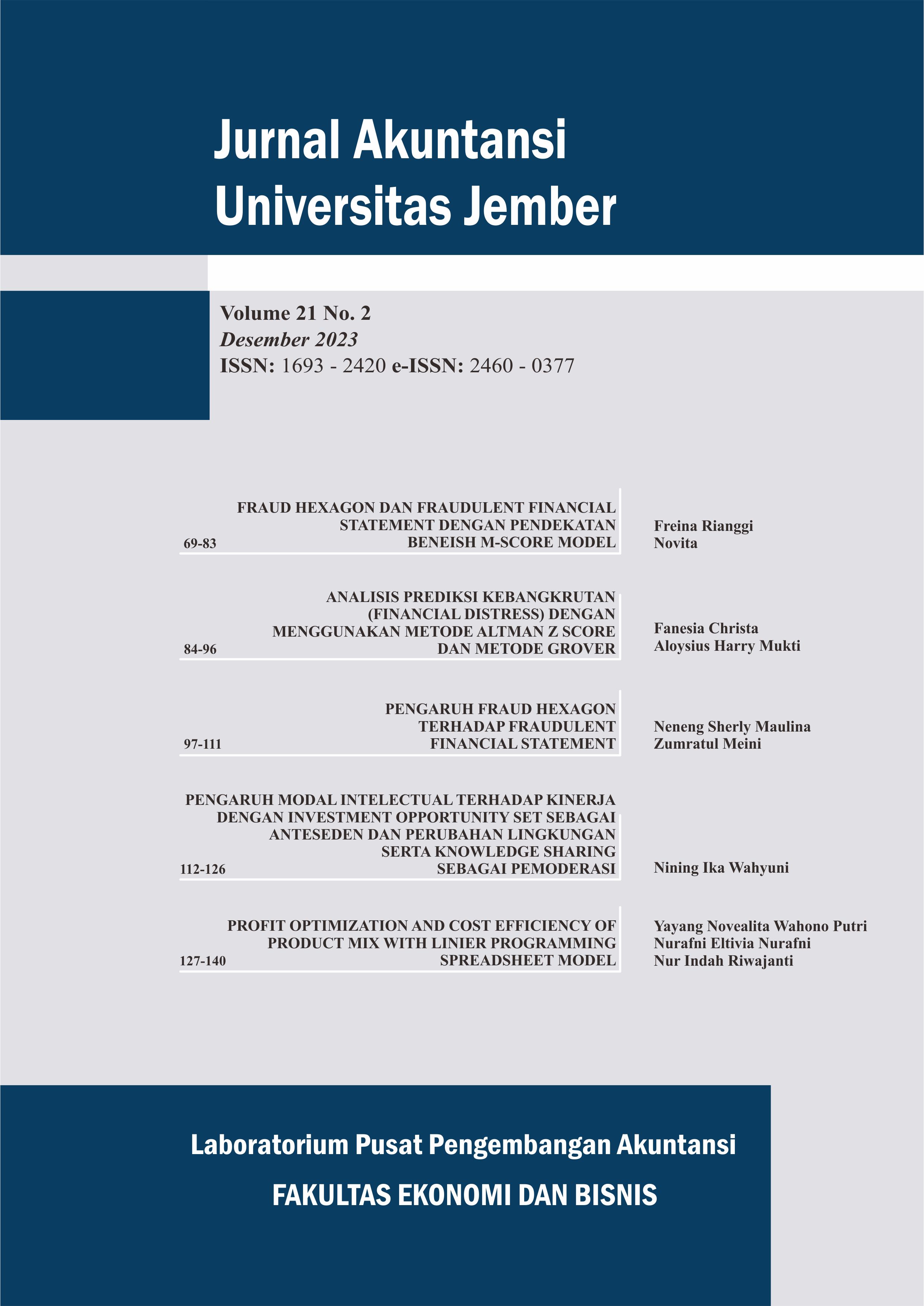PENGARUH MODAL INTELECTUAL TERHADAP KINERJA DENGAN INVESTMENT OPPORTUNITY SET SEBAGAI ANTESEDEN DAN PERUBAHAN LINGKUNGAN SERTA KNOWLEDGE SHARING SEBAGAI PEMODERASI
DOI:
https://doi.org/10.19184/jauj.v21i2.39090Keywords:
Balanced Scorecard, Environmental Change, Intellectual Capital, Investment Opportunity Sets, Knowledge SharingAbstract
ABSTRACT
Research investigating the role of Intellectual Capital (IC) in performance has yielded inconsistent findings. This study aims to identify antecedent variables for IC, positing that IC emerges in response to environmental changes and can only be cultivated through appropriate Investment Opportunity Sets (IOS). Additionally, the study seeks to explore the impact of IC on company performance, with Knowledge Sharing (KS) serving as a moderating variable. Surveys were distributed to companies in a knowledge-intensive industry, utilizing the Balanced Scorecard (BSC) approach to assess key dimensions of organizational performance. Results obtained through Structural Equation Modeling (SEM) using warpPLS 6.0, based on 34 completed questionnaires from banking and manufacturing companies, indicate that investment opportunity sets positively and significantly affect Intellectual Capital. The study establishes the influence of IC on the Balanced Scorecard (BSC) but fails to support the hypothesis that KS moderates the relationship between BSC and IC. Furthermore, the research offers practical implications for managers, suggesting that organizational performance can be enhanced by integrating IC development activities across various IOS alternatives, taking into account environmental changes, and initiating Knowledge Sharing.
Keywords: Balanced Scorecard, Environmental Change, Intellectual Capital, Investment Opportunity Sets, Knowledge Sharing
ABSTRAK
Studi yang mengkaji peran Intelectual Capital (IC) terhadap kinerja masih menunjukkan hasil yang kontradiktif. Tujuan dari penelitian ini adalah untuk mengidentifikasi variabel anteseden untuk IC, dengan asumsi bahwa IC muncul karena perubahan lingkungan dan hanya dapat dibuat melalui set peluang investasi (IOS) yang tepat. Penelitian ini juga mencoba menguji pengaruh IC terhadap kinerja perusahaan dengan menjadikan knowledge sharing (KS) sebagai variabel pemoderasi. Studi ini menggunakan survei yang dikirim ke perusahaan dalam industri berbasis pengetahuan intensif. Pendekatan Balanced Scorecard (BSC) digunakan untuk mengukur dimensi kunci dari kinerja organisasi. Hasil SEM menggunakan warpPLS 6.0 pada 34 kuesioner yang diterima dari perbankan dan perusahaan manufaktur menunjukkan bahwa set kesempatan investasi berpengaruh positif dan signifikan terhadap modal intelektual. Hipotesis kedua yang menyebutkan perubahan lingkungan mempengaruhi hubungan antara IOS dan IC, didukung. Penelitian ini juga membuktikan pengaruh IC terhadap BSC namun tidak mendukung hipotesis bahwa KS memoderasi hubungan antara BSC dan IC. Studi ini juga memberikan implikasi praktis bagi para manajer untuk meningkatkan kinerja organisasi dengan mengintegrasikan aktivitas pengembangan IC dalam berbagai alternatif IOS, mempertimbangkan perubahan lingkungan dan menginisiasi KS.
Kata Kunci: Balanced Scorecard, Environmental Change, Intellectual Capital, Investment Opportunity Sets, Knowledge Sharing
Downloads
References
Bayraktaroglu, A. E. (2019). Intellectual capital and firm performance : an extended VAIC model. Ic. https://doi.org/10.1108/JIC-12-2017-0184
Chen, M. (2014). An Empirical Investigation of the Relationship between Intellectual An empirical investigation of the relationship between intellectual capital and firms ’ market value and financial performance. February 2005. https://doi.org/10.1108/14691930510592771
Eid, R., & Alsharari, N. M. (2018). rn ou l J na tio na er of Or ga ni za tio na l A. September. https://doi.org/10.1108/IJOA-08-2017-1219
Fauzi, M. A., & Rahman, H. (2020). Theories And Antecedents Of Knowledge Sharing Behaviour In Virtual Community : A Systematic Review. June. https://doi.org/10.31620/JCCC.06.20/04
Gatti, M. (2015). Exploring the challenges of measuring intangibles : The implementation of a balanced scorecard in an Italian company. April, 119–133.
Gaver, J. J., & Gaver, K. M. (1993). Jennifer J. Gaver and Kenneth M. Gaver. 16, 125–160.
Greunen, C. Van, Venter, E., Sharp, G., & Africa, S. (2019). The influence of relationship and task conflict on the knowledge-sharing intention in knowledge-intensive organisations. 1–9.
Imam, H., & Zaheer, M. K. (2021). Shared leadership and project success : The roles of knowledge sharing, cohesion and trust in the team. March. https://doi.org/10.1016/j.ijproman.2021.02.006
Kianto, A., & Waajakoski, J. (2021). Linking social capital to organizational growth. April. https://doi.org/10.1057/kmrp.2009.29
Martins, A., Camilleri, M. A., & Jayantilal, S. (2021). Using the Balanced Scorecard for strategic communication and performance management. February, 0–22. https://doi.org/10.1108/978-1-80071-264-520211005
Mehralian, G., Nazari, J. A., Zarei, L., & Rasekh, H. R. (2016). SC. Journal of Cleaner Production. https://doi.org/10.1016/j.jclepro.2016.06.116
Moghaddam, J. Y., & Akhavan, P. (2015). Intellectual capital, ethical climate and organizational performance : an interaction. May.
Rahim, R. A. (2015). Extended Value Added Intellectual Coefficient in Manufacturing Companies : Technology Based Companies. 2(7), 676–706.
Salazar, L., Armando, L., Armando, L., & Salazar, L. (2017). The Resource-Based View and the Concept of Value The Role of Emergence in Value Creation. 35.
Sharabati, A. A., & Nour, A. I. (2017). The Impact of Intellectual Capital on Jordanian Telecommunication Companies. Business Performance. May 2013.
Susanti, N., Widyatama, U., Widajatun, V., Widyatama, U., Bayu, M., Sumantri, A., Widyatama, U., Nugraha, N. M., & Widyatama, U. (2021). Implications Of Intellectual Capital Financial Performance And ( Studies on Goods and Consumption Sector 2013- 2017 period ). January.
Tuan, T. T. (2020). The Impact of Balanced Scorecard on Performance : The Case of Vietnamese Commercial Banks. 7(1), 71–79. https://doi.org/10.13106/jafeb.2020.vol7.no1.71
Umrie, R. H. (2020). Asset Growth , Investment Opportunity Set , Free Cash Flow as Determination of Dividend Payment Probability for Manufacturing Companies in Indonesia. 142 (Seabc 2019), 350–355.



